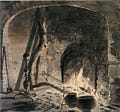The scene is a small cottage, in a crisp winter night, and the poet Coleridge is awake beside the low fire, and his sleeping infant son. He looks to that fire, and he sees a sort of film flickering on the iron grate, a film of soot glowing with heat. In England, that film was called the “stranger.” If you saw one, it meant that somebody was going to …
Keep reading with a 7-day free trial
Subscribe to Word & Song by Anthony Esolen to keep reading this post and get 7 days of free access to the full post archives.


